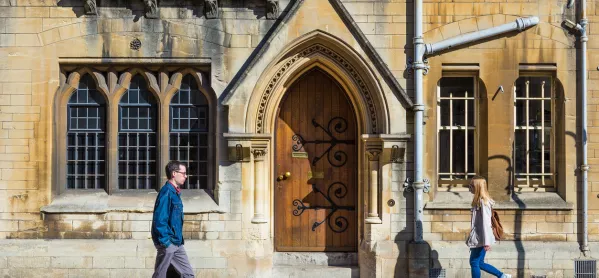- Home
- Oxbridge, look at pupils’ backgrounds - not school
Oxbridge, look at pupils’ backgrounds - not school

My bookcase houses a beautifully bound copy of Longfellow’s poetical works, bearing the embossed gold seal of the City of London School for Girls.
Though there’s no bookplate inside, the family’s always held that it was one of several prizes (others were labelled) won by my grandmother, Patience Trafford, née Randall.
At that time, the school, founded in 1894, must have been in its second decade, still under its founder headmistress, Miss Alice Blagrave.
According to the school history on its website, Miss Blagrave “was keen to encourage and aid her pupils in getting into university”.
But my grandmother never got that chance. When she was about 13, her mother died. So Patience left school to keep house for her father and siblings.
Impossibly tough
I was reminded of that story by a recent Daily Telegraph piece: “Was my son rejected by Oxford because he went to a private school?”
The anonymous writer, granddaughter of a Welsh coalminer pulled out of school aged 15 to work down the pit, describes herself as middle-class, just able to afford a modest (my word) independent school for her very bright son.
Disappointed for her son, she reckons that schools like Eton and Westminster remain an Oxbridge assembly-line. So too are the new selective state sixth-forms backed by independents.
But, as the top universities bow to pressure to increase diversity, she now subscribes to the “growing murmur in the press” that things are becoming impossibly tough for middle-class high-achievers.
Harder in the middle
So are they? The few statistics available suggest that Oxbridge, to name but two top destinations, has a way to go before it can boast a truly diverse intake. But it’s working at it.
Meanwhile, Eton’s headmaster, Simon Henderson, declared in Monday’s Times that giving more top university places to poor pupils will change things for the better, even if entry gets tougher for Etonians (boys attending the best school in the world, by most measures).
Perhaps that mother’s prophecy is right, then: it’ll get still harder for those in the middle.
In the middle of what, though? We’re talking about the admission of an elite academic cohort to a small top end of unbelievably selective institutions.
Nonetheless, that elite is growing. More children in more schools are achieving top results, and therefore aiming high when it comes to higher education. But still too few come from poorer homes.
Looking for potential
While I guess there could always be more outreach - familiarisation visits and summer schools - aimed at those likely to be deterred by their sheer reputation (including that for excellence), top universities are doing their best to remedy the situation.
They don’t rely on raw A-level results to select their elite, employing a raft of pre- and during-interview aptitude tests. They look (or should look) foremost at applicants’ potential, and make lower A-level offers where appropriate.
How they judge such appropriateness is key: not done, I hope, by a crude division between state and independent schools.
They have sufficient information to discriminate between the state-educated child of a wealthy family and one from a deprived family on a private-school bursary, and should not fear to do so.
Barriers still exist
Nowadays no one is forced, as my grandmother and the Telegraph author’s grandfather were, to leave school early to support a family (though poverty still exerts myriad negative impacts).
But barriers still exist. Government should confront honestly the fact that student loans - even with bursaries available - remain a potent deterrent to students from homes familiar with the misery of debt.
Moreover, since private schools are indisputably repositories of expertise in Oxbridge preparation, government shouldn’t merely support them in advising and guiding state school pupils (which many do already) but actually fund bright disadvantaged pupils to attend them.
And it should lean on Oxbridge to review and reverse its refusal to expand.
Such measures will indeed render it harder for Etonians to get to Oxbridge. This is only fair, the school’s head concedes.
More importantly, they would crack open what’s too often portrayed as a bastion of privilege. It would blur the distinction between school types, and remove suspicions that some face discrimination. It would increase fairness.
And it would foster ambition and opportunity in the world’s finest group of universities.
Bernard Trafford is a writer, educationalist, musician and former independent school headteacher. He tweets @bernardtrafford
Keep reading for just £1 per month
You've reached your limit of free articles this month. Subscribe for £1 per month for three months and get:
- Unlimited access to all Tes magazine content
- Exclusive subscriber-only stories
- Award-winning email newsletters



